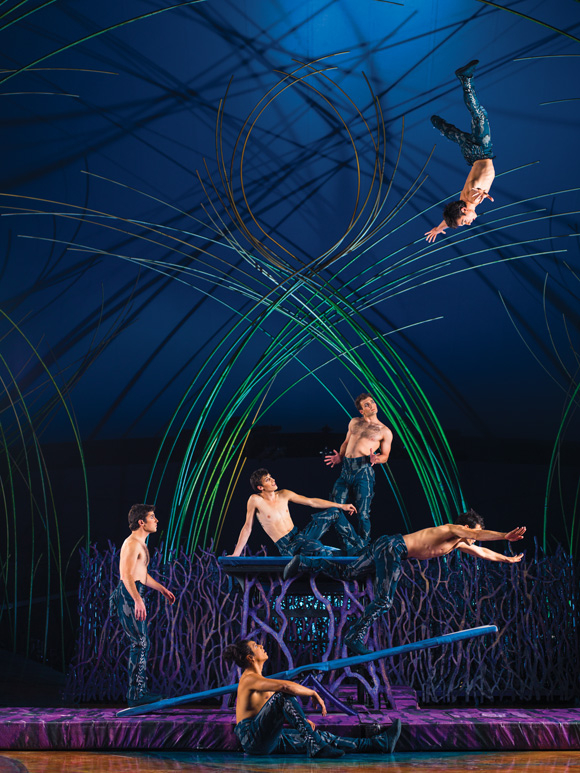Amaluna
Diane Paulus teams up with the legendary Montreal-based circus to create a stunning theatrical spectacle.

(Courtesy of Cirque du Soleil)
Immense trees and lush tropical vegetation sprout miraculously from the parking lot at Citi Field in Flushing, Queens. A beautiful young girl named Miranda inhabits this island of green in a sea of blacktop. So does a powerful magician named Prospera, who conjures a great storm that brings a group of strangers to the island. No, it's not a pop-up production of Shakespeare's The Tempest, but Cirque du Soleil's Amaluna, making its New York City debut. This hypertheatrical spectacle is overflowing with mythic archetypes and epic acrobatics. It's an awesome synthesis of circus and theater from the people who know how to do that best.
Not only is Amaluna a production of Cirque du Soleil (a circus organization known for its rigorous theatricality), but it is helmed by Diane Paulus, whose big-top production of Pippin took home the Tony Award for "Best Revival of a Musical" and earned her a "Best Direction" Tony in 2013. Paulus adorns the death-defying feats in Amaluna with a healthy dose of magic and wonder. Her feminist take on The Tempest freely borrows from the rest of the Shakespeare canon to make for an evening that is at once visually spectacular and dramaturgically sound.
Miranda (Iuliia Mykhailova) stands at the precipice of womanhood. Prospera (Julie McInnes) organizes a grand pageant in Miranda’s honor featuring Chinese acrobats twirling glow-in-the-dark "watermeteors." In the next act, Prospera summons a storm by flying around the stage while playing a blue electric cello. (Vanessa Fournier and Maxim Panteleenko impressively embody the squall, contorting their bodies around each other as they hurtle through the air, dangling from a scarf.) The storm brings a host of unexpected male guests, including the handsome Romeo (Edouard Doye), his clownish servant Jeeves (Nathalie Claude), and a whole troupe of hunky acrobats.
Romeo sees Miranda doing handstands around a huge bowl of water and instantly falls for her. However, he and the other men first have to contend with a band of screaming Amazons. These lady warriors, decked out in red skintight body suits, protect the islands with their deadly archery and fierce uneven-bars routine. The men run around the stage moving tumbling mats and cowering in fear of their female betters.
These bare-chested slaves get their moment after the intermission: The second half opens with an astounding teeterboard routine that has the men launching one another into the air while performing gravity-defying dives and flips. You'll have to collect your jaw off the floor after seeing this act, an unforgettable highlight.
Other memorable moments include Doye performing the world's highest pole dance, Cali (the ever-agile-even-with-a-prosthetic-tail Viktor Kee) juggling fire, and three beautiful Valkyries flying high over the audience. A goddess in the moon (Andréanne Nadeau) watches over the entire thing. Like I said, Paulus liberally borrows her favorite feminine heroines from world mythology to create one big cirque-tacular smorgasbord.
Set designer Scott Pask has built a tropical rainforest within the circus tent. Three large metal towers surround the thrust stage like giant evergreen trees. A circular track of aerial wires canopies the playing space. Mérédith Caron's whimsical costumes evoke grandeur without impeding movement. Her look for Prospera is otherworldly in its androgyny, like David Bowie circa The Labyrinth.
McInnes leans into this ethereal aesthetic, locking eyes with the audience while playing a saxophone with deadly seriousness. She leads an all-female band with her powerful voice and indelible stage presence, perfectly suited for this brand-new chill-inducing score by Bob & Bill (Cirque's Totem).
The only aspect of the show that didn't quite strike the right note was the clowning between Jeeves and Deeda (Sheeren Hickman). Set up like your standard Shakespearean comic-relief subplot (think Maria and Sir Toby Belch in Twelfth Night), this relationship is more confusing than humorous. He's a French pirate; she's a German hausfrau; they have a litter of football babies. (Really, Deeda births a brood of little golden footballs with blonde pigtails and French moustaches.) I'm glad that the acrobats and aerialists have a little time to catch their breath backstage, but I wish that this comedy were as funny as the rest of the show is impressive.
But that's a minor quibble for an otherwise amazing event. There are few places on earth where you can see the kind of feats on display in Amaluna. That fact alone is worth the price of admission and a ride on the 7 train out to Queens.









